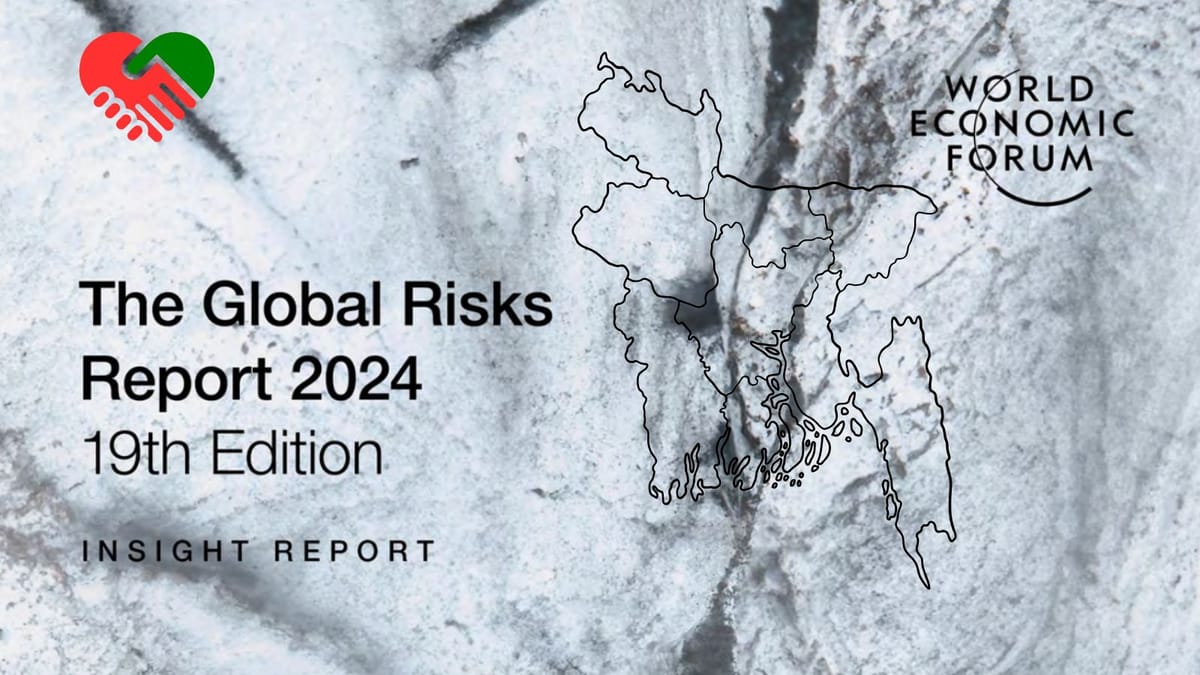Bangladesh in the Global Risk Landscape: Insights from the WEF Global Risks Report 2024

Table of Contents
The World Economic Forum's Global Risks Report 2024 provides valuable insights into Bangladesh's position within the global risk landscape. This comprehensive report reveals several key points about Bangladesh's specific challenges and risk perceptions.
We have scanned the entire report if you don't have time to read it. Here is the relevant information we derived from this report regarding Bangladesh.
Economic and Climate Vulnerability
The report's analysis of climate adaptation readiness identifies Bangladesh as one of the climate-vulnerable markets across developing regions. The report notes that Bangladesh scores relatively low on the ND-GAIN Country Index, which measures its vulnerability to climate change and readiness to improve resilience.
This vulnerability is particularly significant given the report's warning that "climate-vulnerable or conflict-prone countries stand to be increasingly locked out of much-needed digital and physical infrastructure, trade and green investments and related economic opportunities."
Cyclone Preparedness Program
Bangladesh is specifically highlighted for its practical community-based approach to disaster risk management through the Cyclone Preparedness Program (CPP). The report cites this as a positive example of how collective action can play a role in preparing for global risks:
"Bangladesh's Cyclone Preparedness Program both demonstrate the power of collective preparedness to address inevitable environmental risks and how communities can be mobilized to mitigate their impacts... ensuring rapid dissemination of official cyclone warning signals across communities encourages collective preparedness measures to be implemented along Bangladesh's coast."
National Risk Perceptions
In the Executive Opinion Survey portion of the report, Bangladesh business leaders identified their top risks for the next two years. While the report doesn't explicitly list all of Bangladesh's top risks in the narrative sections, it's included in the analysis of countries concerned about "Cybercrime and cyber insecurity."
Research Participation
The report acknowledges Bangladesh's contribution through its Partner Institute, the Centre for Policy Dialogue (CPD), specifically recognizing Dr. Fahmida Khatun (Executive Director), Dr. Khondaker Golam Moazzem (Research Director), Ms. Jebunnesa (Programme Associate), and Nishat Tasnim Anika (Programme Associate).
Broader Context for Bangladesh
The report contextualizes challenges for countries like Bangladesh within several broader global trends:
- Digital Divide: The report warns of a stark disparity in the distribution of AI benefits between high- and low-income countries, potentially leaving vulnerable countries "digitally isolated from turbocharged AI breakthroughs impacting economic productivity, finance, climate, education and healthcare."
- Development Financing Gaps: The report highlights significant financing gaps in reaching development goals for the least developed countries (LDCs), with many LDCs grappling with debt distress.
- Climate Migration: Rising sea levels from potential ice sheet collapses could dramatically alter coastlines, with Bangladesh's low-lying coastal areas making it particularly vulnerable.
While Bangladesh faces significant challenges, particularly regarding climate vulnerability, its Cyclone Preparedness Program stands out as a model of effective community mobilization to address inevitable environmental risks. It demonstrates how collective preparedness can help mitigate impacts even in vulnerable regions.




